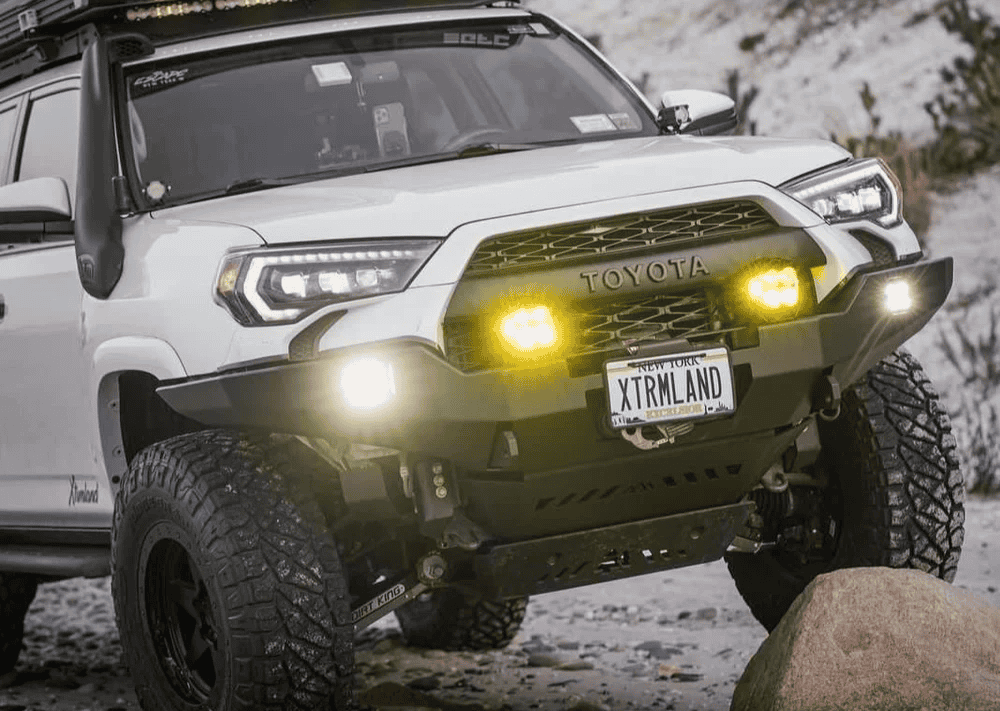Overland Vehicles

The Toyota FJ Cruiser has a ladder frame, short wheelbase, and stout driveline that make it a strong foundation for overland travel. Approach and departure angles are friendly to rugged terrain, and the factory traction control with available rear locker helps when surfaces turn loose or off camber. The 4.0 liter V6 is known for longevity when serviced on schedule, and parts support remains solid. With smart load planning and measured upgrades, the FJ can carry camping gear, water, and recovery tools without losing drivability.
Weight discipline matters on this chassis. The short wheelbase rewards conservative packing, because excess roof weight and heavy rear overhang can affect handling on washboard and in crosswinds. Build decisions should prioritize reliability, serviceability, and range before cosmetics.
FJ Cruiser overland truck on a remote trail with roof rack, lift, and all terrain tires ready for multi day travel.
Suspension tuning is the backbone of any FJ Cruiser overland truck. Choose matched springs and shocks that account for current and future weight rather than chasing lift height alone. A two inch lift with proper travel, bump control, and alignment often rides better and carries loads more predictably than taller setups. Pair with quality lower control arms, fresh bushings, and corrected caster to reduce driver fatigue on long highway stretches.
Tire selection should fit terrain and payload. Many owners settle on a 33 inch all terrain in a load range that suits the truck’s weight. This keeps gearing livable, preserves braking performance, and limits body modifications. If you step to larger tires, address clearance at body mounts and the front pinch seam, and budget for stronger wheel bearings and steering components over time.
Armor needs a purpose. A high clearance front bumper with recovery points protects cooling components and offers a winch mount. Skid plates for the front diff, engine, and transfer case keep vital parts safe from rock strikes. Rock sliders stop door sill damage during tight maneuvers. Avoid unnecessary steel where aluminum or thoughtful driving can accomplish the same protection and save pounds.
Remote travel hinges on fuel, water, and power. The stock tank capacity can be stretched with good route planning, efficient tires, and relaxed pace. For extended trips, consider an auxiliary fuel solution or carry certified containers low and inside the vehicle. Water storage can live in a durable tank along the cargo floor to keep the center of gravity low, paired with a simple pump and inline filtration for camp use.
Electrical systems should be simple, safe, and scalable. A dual battery arrangement or a single high capacity lithium battery with a DC to DC charger provides stable power for a fridge, lights, and charging devices. Add solar for long stays, and fuse every circuit appropriately. Keep cable runs short and protected from abrasion.
Sleeping setups stay comfortable when weight and airflow are considered. A quality roof rack that ties into strong mounting points can hold a roof top tent, recovery boards, and a compact awning, but avoid overloading the roof. Inside the cabin, a flat cargo platform with tie down points keeps gear stable. Soft storage in labeled bags reduces rattles and speeds camp setup.
Recovery planning starts with prevention. Good tires, correct pressure, and a calibrated suspension will solve more problems than any single tool. That said, a well maintained winch, synthetic line, soft shackles, a kinetic rope, and a pair of rated recovery points are invaluable. A compact air compressor with a reliable hose and gauge handles pressure changes. Traction boards shine in sand and snow when used with shovels and smart tire work.
Carry a tool roll tailored to Toyota fasteners, spare belts, fuses, and critical fluids. A scan tool that reads live data helps troubleshoot sensors in the field. First aid, a fire extinguisher, and a clear communication plan elevate safety for solo and group travel.
If you want the benefits above without guesswork, OZK builds complete and partial overland packages that respect the FJ’s strengths. Our team designs suspension for real world payloads, protects the underbody with purpose built armor, and wires clean power systems that are easy to service. Explore our overland rigs to see how we approach capability, comfort, and range across platforms.
When it is time to choose components, we map your objectives, routes, and payload, then select matched springs, dampers, bump stops, and alignment specs. Our custom overland upfit process covers racks, lighting, recovery, and interior storage that keeps weight low and secure. If you are comparing shops and care about communication and handoff experience, learn more at why choose OZK Customs.
Your FJ Cruiser overland truck should feel composed on pavement and confident on dirt while carrying only the gear you truly need. Tell us how you travel, who rides with you, and what distances you aim to cover. We will translate that into a clean, serviceable plan that preserves Toyota reliability and adds the right capability in the right order. Submit your project details and we will schedule a consult, outline cost and timeline, and get your FJ ready for the miles ahead.
Ready to turn your FJ Cruiser into a dependable overland truck built for real miles, real trails, and real comfort? Share your goals and timelines. OZK Customs will blueprint your suspension, power, armor, and storage, then deliver a dialed build that fits your budget and adventure style.
ADDRESS:
6159 E Huntsville Rd, Fayetteville, AR 72701
PHONE:
(479) 326-9200
EMAIL:
info@ozkvans.com